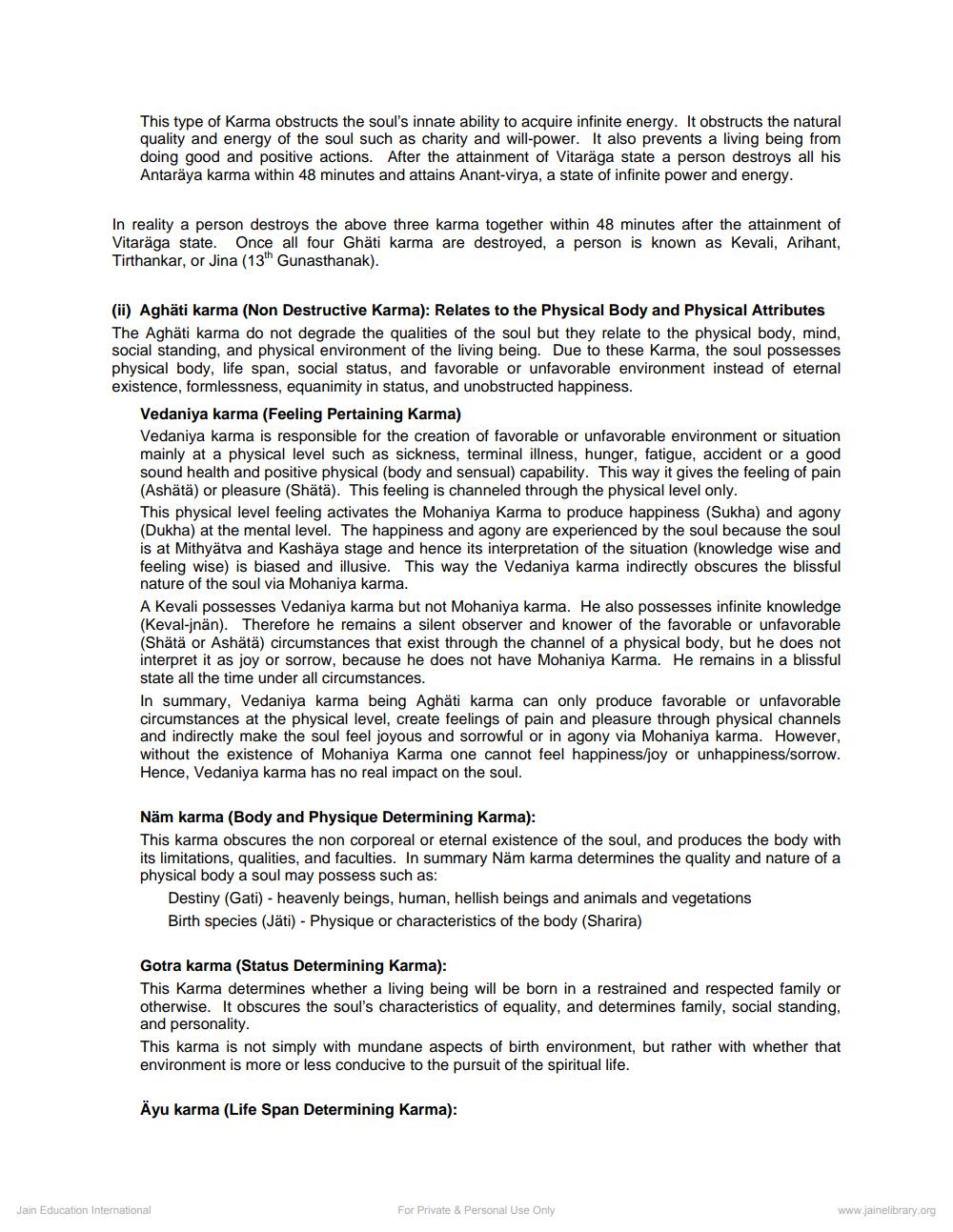Book Title: Nine or Nav Tattvas Author(s): Jaina Education Publisher: JAINA Education Committee View full book textPage 4
________________ This type of Karma obstructs the soul's innate ability to acquire infinite energy. It obstructs the natural quality and energy of the soul such as charity and will-power. It also prevents a living being from doing good and positive actions. After the attainment of Vitaräga state a person destroys all his Antaraya karma within 48 minutes and attains Anant-virya, a state of infinite power and energy. In reality a person destroys the above three karma together within 48 minutes after the attainment of Vitaraga state. Once all four Ghäti karma are destroyed, a person is known as Kevali, Arihant, Tirthankar, or Jina (13h Gunasthanak). (ii) Aghäti karma (Non Destructive karma): Relates to the Physical Body and Physical Attributes The Aghäti karma do not degrade the qualities of the soul but they relate to the physical body, mind, social standing, and physical environment of the living being. Due to these Karma, the soul possesses physical body, life span, social status, and favorable or unfavorable environment instead of eternal existence, formlessness, equanimity in status, and unobstructed happiness. Vedaniya karma (Feeling Pertaining Karma) Vedaniya karma is responsible for the creation of favorable or unfavorable environment or situation mainly at a physical level such as sickness, terminal illness, hunger, fatigue, accident or a good sound health and positive physical (body and sensual) capability. This way it gives the feeling of pain (Ashätä) or pleasure (Shätä). This feeling is channeled through the physical level only. This physical level feeling activates the Mohaniya Karma to produce happiness (Sukha) and agony (Dukha) at the mental level. The happiness and agony are experienced by the soul because the soul is at Mithyatva and Kashäya stage and hence its interpretation of the situation (knowledge wise and feeling wise) is biased and illusive. This way the Vedaniya karma indirectly obscures the blissful nature of the soul via Mohaniya karma. A Kevali possesses Vedaniya karma but not Mohaniya karma. He also possesses infinite knowledge (Keval-jnän). Therefore he remains a silent observer and knower of the favorable or unfavorable (Shätä or Ashätä) circumstances that exist through the channel of a physical body, but he does not interpret it as joy or sorrow, because he does not have Mohaniya Karma. He remains in a blissful state all the time under all circumstances. In summary, Vedaniya karma being Aghäti karma can only produce favorable or unfavorable circumstances at the physical level, create feelings of pain and pleasure through physical channels and indirectly make the soul feel joyous and sorrowful or in agony via Mohaniya karma. However, without the existence of Mohaniya Karma one cannot feel happiness/joy or unhappiness/sorrow. Hence, Vedaniya karma has no real impact on the soul. Näm karma (Body and Physique Determining Karma): This karma obscures the non corporeal or eternal existence of the soul, and produces the body with its limitations, qualities, and faculties. In summary Näm karma determines the quality and nature of a physical body a soul may possess such as: Destiny (Gati) - heavenly beings, human, hellish beings and animals and vegetations Birth species (Jäti) - Physique or characteristics of the body (Sharira) Gotra karma (Status Determining Karma): This Karma determines whether a living being will be born in a restrained and respected family or otherwise. It obscures the soul's characteristics of equality, and determines family, social standing, and personality. This karma is not simply with mundane aspects of birth environment, but rather with whether that environment is more or less conducive to the pursuit of the spiritual life. Äyu karma (Life Span Determining Karma): Jain Education International For Private & Personal Use Only www.jainelibrary.orgPage Navigation
1 2 3 4 5 6 7 8
